Week-end Trip, Day 3
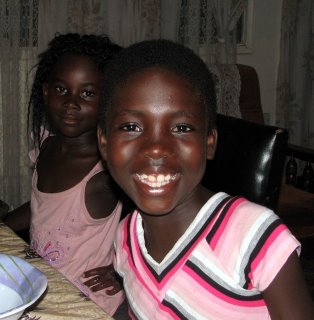 This past week-end I went to the Western Region of Ghana, with our day guard Emmanuel to visit Vida’s ancestral village, as well as the village where his mother lives. This is day three (Sunday).
This past week-end I went to the Western Region of Ghana, with our day guard Emmanuel to visit Vida’s ancestral village, as well as the village where his mother lives. This is day three (Sunday).See pictures from Day 3
On Day 2 we visited people, on Day 3 they visited us. It is Sunday, and so it begins with a long walk around town where we meet up with Emmanuel’s father-in-law, the Twi singer from last night. He lives at the top of the hill that the town is built around and here he gets a great breeze. We sit on his porch, and he asks our mission. I’m getting the hang of this, but thankfully no cokes appear. I’m about coke’d out. What does appear are goats and chickens, who move in and out of the porch area where we are sitting. He shares a duplex with another family and I watch as his neighbor pulls out a machete and whacks away at a 2x4 of mahogany, and adds the chips to the fire. He is cooking palm nuts. I watch the hens come in and pick up abandoned scraps, and the goat tear at a plastic bag, and think about Bird Flu.
 Ghana is a country that has chickens everywhere. When we were waiting to be notified that we were going to Ghana, a bird flu epidemic broke out in Nigeria, a country two countries away and roughly seven hours by car. If bird flu had made it to Ghana, we wouldn’t be here now. I think about all the chickens I we have seen, how they live with the people here, going in and out, mother hens and their little chicks. These are a hardy lot and you never see a dead one on the road, as the stupid ones died off long ago. These are smart and very fast chickens. I think about how hard it would have been to contain an epidemic here, the hundreds of thousands of chickens that would have to be rounded up and slaughtered. It would be unstoppable. Emmanuel asked about it once, and I told him about the epidemic that almost kept us from coming and he said he didn’t believe it, that he would be against the slaughter of chickens to stop the epidemic. He is a wise study, and when even he won’t believe this is necessary, what chance does the rest of the country have?
Ghana is a country that has chickens everywhere. When we were waiting to be notified that we were going to Ghana, a bird flu epidemic broke out in Nigeria, a country two countries away and roughly seven hours by car. If bird flu had made it to Ghana, we wouldn’t be here now. I think about all the chickens I we have seen, how they live with the people here, going in and out, mother hens and their little chicks. These are a hardy lot and you never see a dead one on the road, as the stupid ones died off long ago. These are smart and very fast chickens. I think about how hard it would have been to contain an epidemic here, the hundreds of thousands of chickens that would have to be rounded up and slaughtered. It would be unstoppable. Emmanuel asked about it once, and I told him about the epidemic that almost kept us from coming and he said he didn’t believe it, that he would be against the slaughter of chickens to stop the epidemic. He is a wise study, and when even he won’t believe this is necessary, what chance does the rest of the country have?After we visit a few more people it is time for church, and when we return, Emmanuel’s mother and her brother are there to pay a visit. I ask them their mission, and they tell me they are here to thank us for our visit yesterday. This could go on forever, I think. Me visiting you to thank you for visiting me, you calling on me to thank me for visiting you… We shake hands, I offer them water, as that is what we have, but Emmanuel’s girls are way ahead of me and they have already finished their water. They send Emmanuel away and then plead with me to take him to the US, or sign the papers so he may emigrate. O
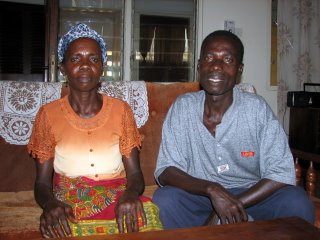 h, so this is your real mission, I think. We get this a lot here. People will just come up and ask for us to sign the paper so they may go to US. If only it were this easy. I tell them I don’t really know how this all works, that especially since 9-11, the emigration restrictions are tight, and I tell them I don’t know what I can do to help Emmanuel get to the US.
h, so this is your real mission, I think. We get this a lot here. People will just come up and ask for us to sign the paper so they may go to US. If only it were this easy. I tell them I don’t really know how this all works, that especially since 9-11, the emigration restrictions are tight, and I tell them I don’t know what I can do to help Emmanuel get to the US.When the visit is over, Emmanuel asks me to drive them back to her village, Trebuom. Today the road work is complete so it should only be a 15 minute drive (it turns out to be 25). We take Margret (his mother), and Kofi (his uncle, her brother). Margret is 53, and has remarried. Emmanuel’s father died five years ago, but his mother had left him years before that and moved back to Trebuom. Emmanuel is 32 and the eldest of nine children. He is he grandson of one of Ghana’s “Big Six,” (Aku Adjie) the founding fathers of Ghana where were arrested in colonial times and now their faces are memorialized on the ¢10,000 note. As the eldest, he has many of the qualities of and eldest child, a bit of a controller, and always thinking he knows best. So it is an interesting dynamic getting ordered about (I’m a youngest child), and yet I’m his boss, and sometimes I disagree with him, or ask him just how does he think this is going to work out (and it ruffles his feathers)?
For example, Sunday in Ghana, is the day when many people go to the beaches. We had planned t
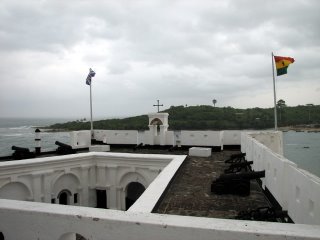 o spend the afternoon at the Busra Beach, but one thing led to another, we visited more people--it will only take 10 minutes (that would be 10 Ghanaian minutes, or two hours)-- and by 2pm I wonder if we should go to the beach at all. I lay out the schedule, and it is like he has never thought of time that way. Sure enough, I am within 2 minutes of the schedule as it plays out, except that we leave the beach 30 minutes early, and so there is time for a short tour of Fort Metal Cross, in Dixcove. Later that night we learn there is a riot in Dixcove, and 2 people are killed, but we see none of that when we are there. We see a 17th century supplier slave fort (it supplied Africans to the big castles to be shipped as slaves) that is being restored to turn it into a bed and breakfast. How weird would that be, I think, sleeping in a dungeon where 100s died painful deaths?
o spend the afternoon at the Busra Beach, but one thing led to another, we visited more people--it will only take 10 minutes (that would be 10 Ghanaian minutes, or two hours)-- and by 2pm I wonder if we should go to the beach at all. I lay out the schedule, and it is like he has never thought of time that way. Sure enough, I am within 2 minutes of the schedule as it plays out, except that we leave the beach 30 minutes early, and so there is time for a short tour of Fort Metal Cross, in Dixcove. Later that night we learn there is a riot in Dixcove, and 2 people are killed, but we see none of that when we are there. We see a 17th century supplier slave fort (it supplied Africans to the big castles to be shipped as slaves) that is being restored to turn it into a bed and breakfast. How weird would that be, I think, sleeping in a dungeon where 100s died painful deaths?Thinking of time as a series of events (wi
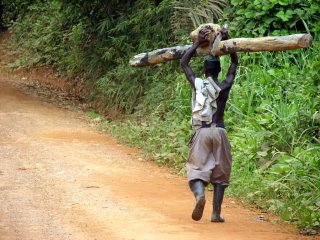 th start, duration, and transition times), is a foreign concept. Literally. Time is not thought of that way in the Ghanaian culture. I’m not sure what the metaphor is. We’re in the car driving home and talking about a trip up to northern Ghana, where the first stop would be a town call Kumasi. The end point would be a northern a town called Tamale, (pronounced Tom-a-lee). Emmanuel says it is a eight hour drive to Tamale. We argue about it a bit. “So what kind of hours are we talking about?” I ask. “Ghanaian hours?” He looks hurt. “It is eight hours I say,” he tells me and I counter, “eight hours will just get you to Kumasi,” unless you’re talking Ghanaian hours.” “What does this mean, Ghanaian hours?” he asks. I tell him about yesterday, visiting his mother, and in-laws how he thought it would only take one hour, and I ask, “One Ghanaian hour, and how many rest-of-the-world hours did it take…four and a half.” Ghanaian hours are different.
th start, duration, and transition times), is a foreign concept. Literally. Time is not thought of that way in the Ghanaian culture. I’m not sure what the metaphor is. We’re in the car driving home and talking about a trip up to northern Ghana, where the first stop would be a town call Kumasi. The end point would be a northern a town called Tamale, (pronounced Tom-a-lee). Emmanuel says it is a eight hour drive to Tamale. We argue about it a bit. “So what kind of hours are we talking about?” I ask. “Ghanaian hours?” He looks hurt. “It is eight hours I say,” he tells me and I counter, “eight hours will just get you to Kumasi,” unless you’re talking Ghanaian hours.” “What does this mean, Ghanaian hours?” he asks. I tell him about yesterday, visiting his mother, and in-laws how he thought it would only take one hour, and I ask, “One Ghanaian hour, and how many rest-of-the-world hours did it take…four and a half.” Ghanaian hours are different.So we’re back to heading to the beach now after so many delays and when we get there, guess what, at 4:02, I predicted 4pm, so I’m feeling pretty smug, and Emmanuel is surprised I can forecast rest-of-the-world time so accurately. “What time is it?” he will ask every time we get into the car now, to see how close I am to predicting how our programe will play out.
I guess what I had begun to notice that first night, was that if I took time to involve myself in the schedule of events, asking questions about this or that aspect, pointing out the unrealistic parts, that it was possible to stay on a schedule measured in rest-of-the-world hours, but it didn’t just happen naturally.
So now it is 11:15am on Sunday, and worship at the Methodist church has been going on now for one hour and fifteen minutes give or take an hour. We drive—it is a two block walk, but this is something he loves, showing up in a big car, the only car in the parking lot. This is a new experience for me, showing up half way through a worship service. Its not new to a lot of people, but for me this is a first. We get in just in time for the announcements—I fall asleep, and Emmanuel is aghast, but it is hot, I’m dressed in funny cloths, and for 20 minutes they have been giving announcements in Twi, and it is feeling like Community Radio again, and its payback for the lost sleep that morning. My eyes shut, and I’m not praying, not even close. He nudges me, just like Suzanne does sometimes. Then it is the offering, actually they do this twice. Here, and in many of the churches we’ve worshipped at, instead of passing t
 he plate, you go forward (dancing along the way) and place your offering in a basket up front. If you are a tither, then you also place a notebook along with your offering so that the elders can record your contribution and return your book during the service. We don’t go up the second time, and the elders of the church approach us, and ask “What is your Mission?”
he plate, you go forward (dancing along the way) and place your offering in a basket up front. If you are a tither, then you also place a notebook along with your offering so that the elders can record your contribution and return your book during the service. We don’t go up the second time, and the elders of the church approach us, and ask “What is your Mission?”Next thing I know I’m in front of the church being introduced, “I bring you greetings from Texas, US,” and the pastor comes to stand over us and prays, in English. Then it is time for the sermon, and the repeated phrase is in English, Put your whole trust in God, and it is only 15 minutes long. This is the shortest sermon I’ve heard in four months, and then church is over, and we go out and shoo the goats from under the car and drive all of two blocks home, except that we don’t drive home, we go to the next town over to visit his sick cousin, whom he found out was sick only this morning. It will only take 10 minutes, he tells me (10 Ghanaian minutes I think). Two hours later, I’m wondering out loud if we should bother going to the beach at all.
We do and Busra beach is wonderful and unlike any we’ve seen in Ghana, more like the beaches of Belize, where the water is waste deep about a half a mile off shore and not rough at all. I’m the only one who goes in the water, Emmanuel and the girls stay on shore. Ghanaians are afraid of the water, and in most places they have a right to be. Ghana has some of the nicest beaches and strongest undertow I have ever experienced. It really feels like someone is pulling at your ankles when the tide goes out, and I’ve heard of a legend about the witch of the sea who steals people and sucks them out to drown. But Busra is different, and I hope to bring my family out here because swimming by myself isn’t as much fun as it is with the family.
We are home by 7pm, just about what I predicted, and dinner is fufu and light soup, it is w
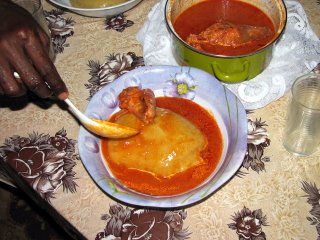 onderful, but I am not that hungry, plus one of our missionary friends told me the key to not getting sick when you are going on village visits like this is to eat “small, small” (to eat small portions).
onderful, but I am not that hungry, plus one of our missionary friends told me the key to not getting sick when you are going on village visits like this is to eat “small, small” (to eat small portions).When Ghanaians want to say little, they say “small, small”. I wonder if it is a Twi-ism, anyway it has crept into our family language where we say “small, small” now, and it always brings a smile. Tonight ends as yesterday ended, with Vida absent, Emmanuel, out looking for her, and the girls and I singing along with their grandfather, but we have visitors.
I am told they have come to greet me. This is Vida’s sister and husband from yesterday, the first home we visited yesterday morning. They have come to thank me for my visit and now want a ride home. I tell Emmanuel that it is dark and I don’t feel safe driving these roads at night. He asks again and the singing grandfather steps in for me, pleading that I am tired and can not drive them. I feel bad saying no, but I am beginning to get the feeling that everyone wants a ride in the car, and while I don’t mind, I do mind at 9pm on a very dark night. In the distance I hear thunder.
 We walk them to the Taxi station and for ¢20,000 they take a taxi. I would have gladly paid that two dollars not to be on the road that night.
We walk them to the Taxi station and for ¢20,000 they take a taxi. I would have gladly paid that two dollars not to be on the road that night.So we go inside and sing songs, and I hear more Twi versions of standard hymns plunked out on honky-tonk guitar. I am looking for another song, and grandfather says, “Please pastor, it is almost raining.” So what I think, we’re singing. “Please, pastor, it is about to rain.” Oh, I get it, he can’t leave until I allow him, and so we stand, I thank him for visiting and singing, and then tomorrow promise to visit him at his workshop. He walks home before the rain begins.
As I go to sleep that night I am thankful that I am not out driving strange dark roads in a downpour that will last most of the night.
See pictures from Day 3
Labels: Ghana, rural village

0 Comments:
Post a Comment
<< Home